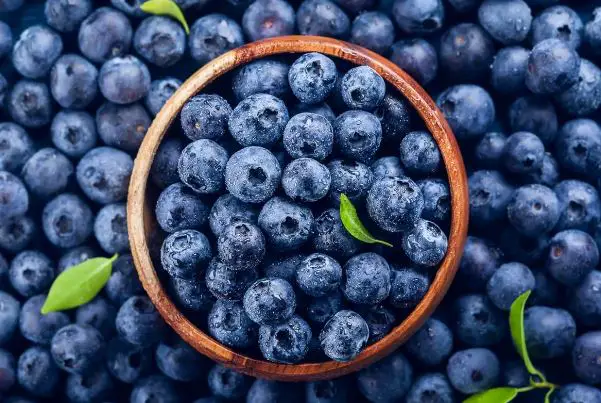Regular consumption of fruits has a positive effect on health. In fact, the ideal is to eat between 3 and 5 pieces a day. What are the lower carb options? Discover some recommended ones.

There are those who wonder if there are fruits with less carbohydrates than others. Regarding this, there are many doubts, especially when the goal is to lose weight. Well, first of all it should be remembered that these foods are essential in any healthy eating plan.
As stated in a publication in the medical journal Advances in Nutrition, its daily consumption is associated with the prevention of diseases, especially those associated with inflammatory processes such as obesity and diabetes. In particular, this is attributed to its high contribution of micronutrients, such as vitamins, minerals and antioxidants.
Regarding its carbohydrate content, it must be considered that it depends largely on the type of fruit, as well as its degree of maturity. While this macronutrient provides energy, many seek to limit their intake in order to lose weight more easily.
Types of carbohydrates and sources
First of all, it should be clear that carbohydrates alone do not have the ability to lead to weight gain. They are also not harmful to health. Contrary to this, they are essential nutrients – composed of carbon, oxygen and hydrogen – that provide energy and fulfill specific functions in the body.
Now, it must be borne in mind that there are several types of carbohydrates and their sources are also different. Next, we detail the 3 main ones.
Sugars
On the one hand, there are sugars or “simple carbohydrates”, which are the most basic form that exists (the best known is glucose). If they clump together, a “complex” carbohydrate can form. They are characterized by having a sweet taste and because they can be absorbed quickly in the intestine. Consequently, they cause an increase in insulin in the blood.
Among foods that contain simple sugars are honey, table sugar and fruits, although milk sugar, soft drinks, desserts and processed foods that are made in industries are also included.
Regarding all these foods, they are said to have a high glycemic index. That is, they generate a rapid increase in blood glucose, which is associated with its absorption capacity.
Starches
Also called complex carbohydrates, they consist of the union of multiple sugar molecules. In nature, those of this type predominate, since this is the way in which plants keep their reserves.
Thus, tubers such as potatoes, sweet potatoes and cassava are clear examples of this. There are also starches in legumes, whole grains, corn, among others.
Specifically, these carbohydrates are beneficial to health, since they have a low glycemic index, that is, they are absorbed slowly and do not produce alterations in blood glucose levels.
Fiber
Dietary fiber is also a complex carbohydrate. It is a group of substances that can be described as indigestible carbohydrates by the gastrointestinal tract. They are present in vegetables, fruits, cereals, grains, beans, nuts, and seeds.
The World Health Organization recommends a daily intake of 400 grams of fruits and vegetables because they are a source of fiber, and this component is associated with several health benefits.
In particular, fiber can help in the following:
Prevent intestinal problems, such as constipation.
Decrease intestinal absorption of cholesterol.
Regulate blood glucose levels after each meal.
8 fruits with less carbohydrates
As mentioned, all fruits have carbohydrates. However, some have a higher supply of fiber and water, which means that they will have lower sugar content. Let’s see the most prominent ones below.
1. Blueberries
This fruit, in addition to having less carbohydrates than others, is considered a supplement to reduce the risk of diseases. This is because it is rich in dietary fiber, vitamin C, vitamin K, and flavonoids.
For all this, it helps protect the body against DNA damage, one of the causes associated with aging and cancer. Regarding this issue, various scientific publications have suggested that, if consumed regularly, it can help the following:
Prevent urinary tract infections.
Prevent brain diseases.
Reduce blood pressure.
Lower blood sugar levels.

Blueberries are low in calories and concentrate fiber, antioxidants and other bioactive compounds with beneficial health effects.
2. Kiwi
Kiwis are fruits that provide 15 grams of carbohydrates per 100 grams of food. This fruit stands out for having abundant doses of vitamin C. For this reason, they are recommended to avoid colds and to maintain the integrity of the skin.
In addition to being low in calories, they provide substances such as fiber, folates, potassium, vitamins E and K, and other phytochemicals. As expressed in a study published in 2016, the regular consumption of this fruit has positive actions on the following:
Immune function and antioxidant defense.
Protection of the respiratory tract.
Gastrointestinal function.
3. Apple
The apple provides a high percentage of water, fiber, vitamin C, potassium and vitamin K. On these fruits, studies suggest that they are important preventive of chronic non-communicable diseases.
Another important health benefit of this fruit is its content of pectin, a type of prebiotic fiber that maintains satiety and helps maintain the integrity of the intestines.
4. Avocado
Besides being a low carb fruit, avocado is made up of healthy fats. These include oleic acid, a monounsaturated fat that is linked to reduced inflammation and heart and vascular health. Added to this, it contains potassium, fiber and magnesium.
5. Granada
Pomegranate contains bioactive compounds that give it health benefits. It is useful to improve the flavor of salads, as it is refreshing and low in calories. It is estimated that it provides up to three times more antioxidants than green tea or red wine. Therefore, it is associated with the prevention of inflammatory diseases.
6. Strawberries
Compared to other fruits, strawberries have a low glycemic index. In addition, they provide nutrients such as vitamin C, manganese, folate, and potassium. Like other berries, they have an important anti-inflammatory character, so their consumption within a balanced diet is advisable.
7. Orange
Orange is one of the most popular citrus fruits. Its components include vitamin C, potassium, folate and thiamine. It is also a good source of dietary fiber and, therefore, contributes to satiety and digestive health.
8. Guava
Guava is a tropical fruit with an outstanding nutritional profile. Provides fiber, folate, vitamins A and C, potassium, copper and manganese. In turn, it contains antioxidant substances, is a source of pectin and is low in calories.

Guava stands out for its contribution of vitamin C, a micronutrient that helps strengthen the immune system.
What should you remember about fruits with less carbohydrates?
Although we mention only a few fruits, the list is actually broader. In fact, beyond the contribution of carbohydrates they have, it should not be overlooked that they are good providers of health protective substances. Although they contain sugars and starches, they do not tend to increase blood glucose levels.
It is also not true that the consumption of fruit by itself makes you fat, even if they contain carbohydrates. Rather, they are necessary foods that are part of a healthy and balanced diet.





